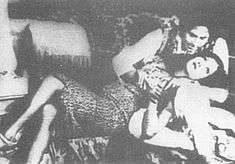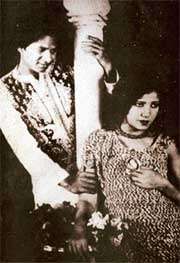Zubeida
- For the 2001 film, see Zubeidaa. For the Indian actress on which it is based, see Zubeida Begum.
| Zubeida (actress) | |
|---|---|
|
Master Vithal and Zubeida in Alam Ara, 1931. | |
| Born |
Zubeida Begum 1911 Surat, Bombay Presidency, British India |
| Died |
September 1988 Bombay, Maharashtra, India |
| Occupation | Film actor |
| Years active | 1922-1949 |
| Religion | Hinduism |
| Spouse(s) | Maharaj Narsingir Dhanrajgir Gyan Bahadur |
| Children |
Humayun Dhanrajgir (Son) Dhurreshwar Dhanrajgir (Daughter) |
Zubeida Begum Dhanrajgir (1911-1988) was an Indian film actress. She acted in the first Indian talkie movie Alam Ara (1931).[1] Her credits include early hits Devdas (1937), and Sagar Movietone's first talkie, Meri Jaan.
She was among the few girls who entered films at a tender age during a time when it was not considered an appropriate profession for girls from respectable families, let alone Royalty. Born in Surat city of Gujarat in western India, Zubeida was a stunningly beautiful Muslim princess, the daughter of Nawab Sidi Ibrahim Muhammad Yakut Khan III of Sachin State and Fatima Begum. She had two sisters, Sultana and Shehzadi, both actresses.
Career
Zubeida was only 12 when she made her debut in Kohinoor. Through the 1920s she made infrequent appearances on screen along with Sultana who, by then, had become one of Indian cinema's loveliest leading ladies. One of the films to star the two sisters was Kalyan Khajina in 1924. They had also shared the screen in Zubeida's first blockbuster, Veer Abhimanyu released two years earlier, that also had their mother, Fatima Begum, playing an important role.

In 1925 Zubeida had nine releases, amongst them Kala Chor, Devdasi and Desh Ka Dushman. A year later she starred in her mother's film, Bulbul-e-Paristan. 1927 was memorable for her with movies Laila Majnu, Nanand Bhojai and Naval Gandhi's Sacrifice which were very successful movies at this time. The latter, based on Rabindranath Tagore's 'Balidan', also starred Sulochana Devi, Master Vithal and Jal Khambatta. It condemned the age-old custom of animal sacrifice in certain Kali temples in Bengal. The Members of the Indian Cinematograph Committee were wowed by this "excellent and truly Indian film". Its European members recommended that it be sent abroad for screening.
Zubeida starred in a string of silent films before Alam Ara proved to be the turning point in her career and was her biggest hit. She suddenly was highly in demand and got wages high above the standards for a woman in the film industry at that time.
Through the '30s and early '40s she made a hit team with Jal Merchant and starred in several successful mythological films playing characters like Subhadra, Uttara and Draupadi. She was also successful in portraying emotions with films such as Ezra Mir's Zarina which had her playing a vibrant, volatile circus girl whose kisses steamed up the screen and sparked off heated debate on censorship. Zubeida was one of the few actresses to make a successful transition from the silent era to the talkies.
In 1934 she set up Mahalakshmi Movietone with Nanubhai Vakil and had box-office bonanzas in Gul-e-Sonobar and Rasik-e-Laila. She continued to appear in one or two films a year till 1949. Nirdosh Abla was her last film.
Personal life
Zubeida married Maharaj Narsingir Dhanrajgir Gyan Bahadur of Hyderabad. She is the mother of Humayun Dhanrajgir and Dhurreshwar Dhanrajgir, mother of Sanjay Dutt's former wife, model Rhea Pillai. She converted to Hinduism upon marriage.
Death
Zubeida spent her last years in Dhanraj Mahal Palace. She died in 1988[2] and was laid to rest at Chhatrapathi Shivaji Maharaj Marg, Apollo Bunder, Colaba, south Mumbai amongst her children and grandchildren. She is survived by her son Humayun and grandchildren Nikhil Dhanrajgir, Ashok Dhanrajgir, Rhea Pillai and Karen Nina, and her son James Michael.
References
- ↑ First Talkie Actress - Rani Zubieda www.downmelodylane.com.
- ↑ With Rani Zubeida Dharajgir's death:Curtain comes down on silent movie. The Free Press Journal]] 17 October 1988 Archived 16 July 2011 at the Wayback Machine.
External links
 Media related to Zubeida at Wikimedia Commons
Media related to Zubeida at Wikimedia Commons- Zubeida at the Internet Movie Database
- India Heritage:Performing Arts:Cinema In India:Personalities:Silent Screen Stars.
- Zubeida profile
